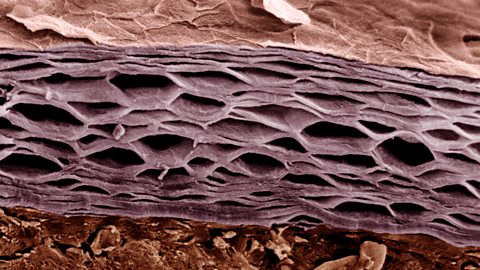Importance of water balance in the body
Water content
Osmoregulation is the control of water levels and mineral ions (salt) in the blood.
Water levels and mineral ions in the blood are controlled to keep the concentrations the same inside the cells as around them. This protects cells by stopping too much water from entering or leaving them by osmosis. If body cells lose or gain too much water, they do not function efficiently.
If the concentration of water is the same inside and out the cells, they remain in their normal state. If the water concentration is too high outside, water enters the cell by osmosisThe movement of water molecules across a selectively permeable membrane from a region of higher water concentration to a region of lower water concentration. and they may burst.
On the other hand, if the water concentration is too low outside compared to the inside of the cells, water will leave by osmosis and the cells may shrivel. If body cells lose or gain too much water by osmosis they do not function efficiently.
Human excretory organs
The organs of excretion in humans include the skin, lungs and kidneys.
Water is lost from the body as:
- sweat from the skin
- water vapour, from the lungs when we exhale
- urine from the kidneys
Skin
Sweat glands in the skin produce sweat. Water, ions and urea are lost from the skin as they are contained in sweat.

Lungs
Water leaves the body via the lungs when we exhaleBreathe air out. as well as excess carbon dioxide.
We cannot control the level of water, ion or urea loss by the lungs or skin. For example, in a hot climate, your body sweats to help keep you cool. In the same way, when we breathe out we lose water vapour, and we cannot alter the amount we lose.
Kidneys
The kidneys are organs of the urinary system - which removes excess water, mineral ions and urea. Our bodies can control the amount of water and ions removed by the kidneys. This is called osmoregulation.
Learn more about water and nitrogen balance with Dr Alex Lathbridge.
Listen to the full series on В鶹№ЩНшКЧТіИлїЪ Sounds.
Explore how the kidneys maintain water levels in the body and how nitrogen is balanced.